University of Arkansas–Fort Smith
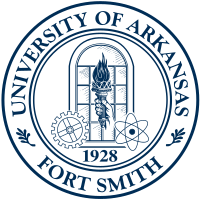 | |
| Type | Public university |
|---|---|
| Established | 1928 |
| Endowment | $73.4[1] |
| Chancellor | Paul B. Beran |
Academic staff | 220 |
| Students | 6,637 (Fall 2017) |
| Location | Fort Smith, Arkansas, U.S. |
| Campus | 168 acres (0.68 km2) |
| Colors |
Navy Blue and White |
| Nickname | Lions |
Sporting affiliations | NCAA Division II–Heartland Conference |
| Website |
uafs |
|
| |
The University of Arkansas–Fort Smith (UAFS) is a public, co-educational, four-year university located in Fort Smith, Arkansas, United States, It is one of 13 campuses that constitute the University of Arkansas System. UAFS is the sixth-largest four-year university in Arkansas, with a fall 2017 enrollment of approximately 6,637 students. The university offers in-state tuition rates not only to Arkansas residents, but also those from Louisiana, Mississippi, Missouri, Oklahoma, Tennessee, and Texas.
As of fall 2017, UAFS is the most affordable four-year university in the state[2] and boasts a consistent 85 percent job and graduate school placement rate among its graduates.[3] The university campus occupies 168 acres (0.68 km2) of an award-winning, nationally recognized arboretum that has 1,182 GPS-inventoried trees representing 81 species.
History
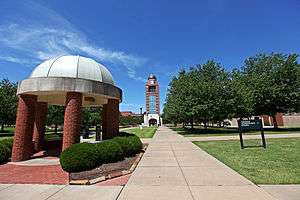
The University of Arkansas–Fort Smith was established in 1928 as an extension of the public school system in Fort Smith, Arkansas, with the superintendent, James William Ramsey, acting as the college president and the high school principal as dean. Known originally as Fort Smith Junior College, the institution operated within the Fort Smith public school system until 1950, when the school was incorporated as a private, nonprofit institution with its own governing board. In September 1952, the College moved from borrowed facilities in the high school to its current site, initially occupying 15 acres (61,000 m2).
During the private college era, enrollment increased, as did course offerings, the number of faculty, and facilities. A vocational-technical division was added in 1960. During this period, the college began developing the programs and character of a comprehensive community college—a new concept in Arkansas and across the nation.
In the fall of 1965, the Sebastian County electorate approved the creation of the Sebastian County Community Junior College District, along with a tax levy on the real and personal property of the county. The governor appointed a Board of Trustees, and the school again became a public institution.
In 1966, the institution's name was changed from Fort Smith Junior College to Westark Junior College, and in 1972, to Westark Community College, indicating the larger area to be served and reflecting the more comprehensive mission.
Throughout the 1980s and early 1990s, the college developed and made changes within the context of its mission as a two-year institution. A significant development in 1989 was the establishment of a University Center. Five state universities partnered with the institution to offer six bachelor's and seven master's degree programs on campus. Between 1989 and 2002, 1,788 students graduated with bachelor's degrees through the University Center.
In 1997, the Arkansas Legislature passed an act granting Westark the authority to offer in its own right up to nine applied bachelor's degrees, developed in response to identified needs of the industries in the area served.
The name of the college was changed yet again in February 1998 to Westark College, more accurately portraying the role and scope of the institution.
On December 15, 2000, the Board of Trustees of Westark College entered into an agreement with the Board of Trustees of the University of Arkansas to merge with the University of Arkansas System as a four-year institution. In 2001, the Sebastian County electorate voted to support the merger. A formal request to change affiliation status to that of a bachelor's degree-granting institution under the name of the University of Arkansas–Fort Smith was submitted to the Higher Learning Commission in August 2001 and approved by the Institutional Actions Council on November 19, 2001.
The merger, which became official on January 1, 2002, endorsed the concept of UAFS as a unique university, one that offers applied and traditional baccalaureate degree programs, one- and two-year associate and technical programs, and non-credit business and industry training programs.
In 2006 Arkansas state senator David Bisbee attempted to review the University of Arkansas–Fort Smith's legal status. Bisbee claimed he wanted to make sure the institution was in good legal standing.[4]
Mathew Pitsch, a former dean of the College of Applied Science and Technology, has been since 2015 a Republican member of the Arkansas House of Representatives for Sebastian County.[5]
Colleges
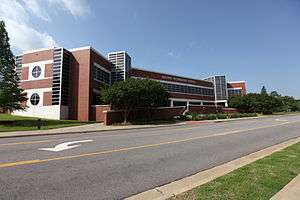
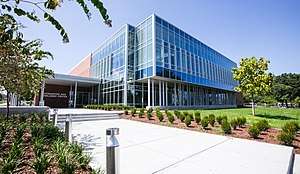
Through its six colleges, UAFS provides certificates of proficiency, technical certificates, associate of arts degrees, associate of general studies, associate of applied science degrees, and bachelor's degrees, as well as work-based learning and community education. The six colleges are:
- The College of Applied Science and Technology
- The College of Business
- The College of Health Sciences (Includes Carolyn McKelvey Moore School of Nursing)
- The College of Communication, Languages, Arts and Social Sciences
- The College of Science, Technology, Engineering & Mathematics (Includes School of Education)
Campus

Windgate Art & Design
Windgate Art & Design is a state-of-the-art visual arts facility located on the UAFS campus that opened in fall 2015. The 58,000 square foot building was constructed following a $15.5 million gift to the university from the Windgate Charitable Foundation. The building includes a letterpress and printmaking studio, a film theater, a videography and photography studio, and numerous classrooms and professional-quality artistic spaces.
Recreation and Wellness Center
The Recreation and Wellness Center, more commonly known as the RAWC, is a 47,000 square foot facility that offers multiple facilities, including basketball and volleyball courts, an expanded fitness area with new equipment, a three-lane running track, and a rock climbing wall. The building was opened in fall 2016.
Art galleries
The University houses three art galleries that are free and open to the public. The Mary Tinnin Jaye Gallery and the Sally Boreham Gallery are permanent displays that include works rendered in traditional media as well as digital prints and photographs. The Smith-Pendergraft Campus Center's Traveling Art Gallery features rotating exhibits.
Arboretum
In cooperation with the Arkansas Forestry Commission, UAFS strives for excellence in "tree preservation, care, and planting, while at the same time developing an educational urban forestry awareness program and arboretum
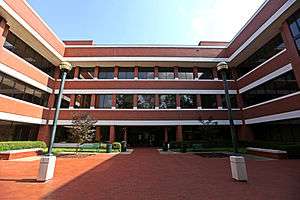
master plan." To this end, the University has made the entire campus an arboretum, with more than 69 species of trees mapped out by GPS technology.
The campus grounds have won numerous awards for landscaping and horticulture.
Awards
- The Ball Horticultural Company Floral Displays Champion–America in Bloom 2005 (AIB)
- Green Star Grand Award for the Best Maintained Landscape in the Nation–School or University Category–Professional Grounds Management Society 2003 (PGMS)
- Distinguished Service Award–Keep Arkansas Beautiful 2002 (KAB)
Reynolds Bell Tower
.jpg)
The Donald W. Reynolds Bell Tower was commissioned on May 21, 1993 and dedicated on September 22, 1995. The tower itself stands 108 feet 10 inches (33.17 m) tall and is a full seven stories. It is the largest free-standing belfry in the South Central United States and houses the largest installation of cast bronze bells on a college campus between Texas A & M and the University of Nebraska. At specific hours throughout the day, prerecorded and live carols are played throughout campus by the giant brass carillon of the tower. The Reynolds Bell Tower stands at the head of an expansive open space of green grass in the middle of campus known simply as "The Green". The area is often occupied by students studying, playing pick up sports games, or just lounging in the grass.
Numa

In front of the Stubblefield Center, home of the Lions basketball and volleyball teams, is the newly erected Numa statue. The statue is a 15-foot (4.6 m) long, bronze rendition of the University's mascot. The sculpture was unveiled on April 28, 2010, and is the largest statue of a leaping lion in the world.
Athletics
UAFS athletic teams are known as the Lions. The University competes in a variety of collegiate athletics as a member of the National Collegiate Athletic Association (NCAA) at the Division II level.[6] The university is a member of the Heartland Conference and sponsors men's sports, including: baseball, basketball, cross country, golf and tennis; women's sports, including: basketball, cross country, golf, tennis, and volleyball.[7] UAFS announced the addition of women's soccer for the 2012–13 academic year.[7]
Student life
Student housing
The Sebastian Commons Apartments provide upperclassmen with a gated, on-campus housing community. The Commons has a 480-bed occupancy. The rooms are fully furnished and equipped with wireless Internet access. A traditional dorm-style residence hall with on-site dining, the Lion's Den, opened in August 2010. In the fall of 2011, the university set aside two buildings in the Sebastian Commons for Greek housing.
Greek life
Greek Life at the University of Arkansas–Fort Smith began in the Spring of 2007. The university now boasts eight Greek Organizations including three IFC Fraternities, three National Panhellenic Sororities, and one Multi-Cultural Sorority.[8] Students in Greek Organizations are highly involved on campus boards and are noted leaders in campus activities. The All Greek GPA average has consistently been higher than the All Campus GPA since the appearance of Greek Life on campus.
|
Fraternities:
|
Sororities:
|
Notable alumni
- Justin Boyd, member of the Arkansas House of Representatives from Fort Smith since 2015
- Sonny Weems, former member of the Phoenix Suns
References
- ↑ As of October 2017. "U.S. and Canadian Institutions Listed by Fiscal Year 2009 Endowment Market Value and Percentage Change in Endowment Market Value from FY 2008 to FY 2009" (PDF). 2009 NACUBO-Commonfund Study of Endowments. National Association of College and University Business Officers. Archived from the original (PDF) on December 14, 2017. Retrieved February 17, 2012.
- ↑ "UAFS touts it is the most affordable four-year university in Arkansas - Talk Business & Politics". Talk Business & Politics. 2017-06-12. Retrieved 2017-10-20.
- ↑ "UAFS Study Touts Job Placement Percentage". Times Record. Retrieved 2017-10-20.
- ↑ "Beran: UAFS Formed Legally"
- ↑ "Mathew Pitsch". ballotpedia.org. Retrieved April 9, 2015.
- ↑ Pickle, David (July 13, 2011). "Five new active members join Division II". NCAA. Archived from the original on July 16, 2011. Retrieved July 17, 2011.
- 1 2 Staff (July 8, 2011). "NCAA grants UAFS active member status; adds soccer". The City Wire. Retrieved July 17, 2011.
- ↑ "Campus Life: Fraternities and Sororities". Retrieved May 8, 2017.
External links
| Wikimedia Commons has media related to University of Arkansas-Fort Smith. |
Coordinates: 35°23′01″N 94°22′29″W / 35.383583°N 94.374651°W